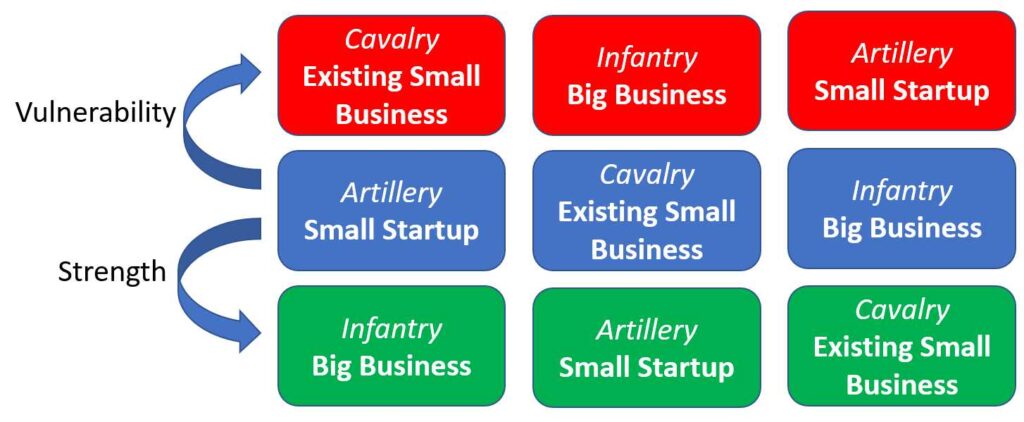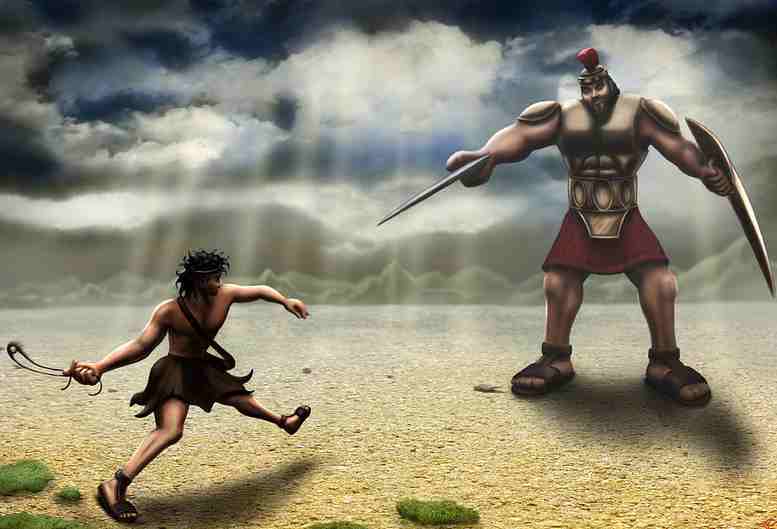One concern I hear over and over again from startups and small business owners is that they find it difficult to compete with other companies in their industry. The problem with their assessment is that it is rooted in the premise that business is a head-to-head battle of attrition.
Jiu-Jitsu uses the opponent’s force against themselves rather than confronting them with one’s own force. Therefore, the savvy small business owner practices business Jiu-Jitsu to make the competitor’s strengths their weaknesses.
To see how this may be applied to your business, let’s first consider how land wars have been fought throughout history by a nation’s armies. Armies have three basic types of units at their disposal:
- A strong but slow Infantry for close combat
- A light and quick Calvary but weakly armored
- And an Artillery that can attack targets from a long distance but has no armor
Each unit has its strengths and weaknesses. In this way, an army can be compared to the game “rock paper scissors.” Each object in the game of rock paper scissors overcomes one object and can be overcome by another. Scissors cut paper, but rock breaks scissors.

In our warfare example, the speed of the cavalry makes it a hard target for artillery to hit, but slow-moving infantry units are sitting ducks for artillery. Likewise, the long range of artillery makes it invisible to infantry but being less mobile and unarmored, it is vulnerable to a fast-moving cavalry unit. And a heavily armed/armored infantry can make short work of lightly armed cavalry, but since they move slowly, they are easy targets for artillery. So, cavalry beats artillery, artillery beats infantry, and infantry beat cavalry.
David vs. Goliath
Now let’s consider the story of David and Goliath. Goliath was big and strong, covered with heavy armor, and equipped with weapons for hand-to-hand battle. He was a super infantryman.
David was a shepherd boy used to fighting predators at a distance by hurling rocks at them with his sling. David was an accomplished artilleryman.
David would have been quickly defeated by Goliath in a hand-to-hand battle. However, David understood what I call the “Underdog Strategy,” which is that you never fight a battle against your enemy’s strength.
David recognized that artillery beats infantry and volunteered to stand up to Goliath. David was small, but he fought in a way that did not suit Goliath.
We know the outcome of their battle. Being bigger in a straight-up fight may give you the advantage, but it also means that you are slower, which makes you vulnerable to a more agile opponent.
Related Post: How to Create a WOW Statement

We can extend the metaphor of armies to business. Artillery units are like small startups. Cavalry units are like existing small businesses. And infantry units are like business businesses.
Small Startup
As a small startup, you are like David, an Artilleryman. Small startups have minimal business acumen, no access to much capital, and therefore have basically no armor and limited mobility.
Strength – A large business is more like Goliath, an Infantryman who is slow but very well-armored. Your strength as a small startup is that you can take potshots at large business competitors with relative impunity. As a small startup, because of your relatively smaller size and distance, most large businesses will not have the bandwidth to retaliate and will often just ignore you as you chip away some of their customers until it is too late and you have secured a beachhead.
Vulnerability – However, as a small startup, you are vulnerable to an existing small business because they have better cash flow and, by redirecting their discretionary income, can react more quickly than a small startup. Existing small businesses also work in a known environment. They know their customers and what they like and have greater business acumen to take advantage of opportunities that a small startup can’t. Sometimes, existing small businesses will simply capture, through acquisition, small startups as they grow.
Existing Small Business
As an existing small business, you are fast and light like a calvary unit.
Strength – Your strength as an existing small business is your speed of execution and your ability to take action. As an existing small business, you possess some armor in the form of business acumen and cash flow that allows you to take advantage of opportunities without having to raise new risk capital like a small startup. Existing small businesses can inflict serious damage to small startups that can’t react as quickly and don’t have sufficient armor to protect themselves from your blitzkrieg. Sometimes existing small businesses will simply capture, through acquisition, a small startup.
Vulnerability – However, as an existing small business, you are on the radar screen of large businesses in your industry. You remain vulnerable to a larger business with extensive resources far beyond yours. If a big business wants what you have, they have the legal and financial capital to just take it or crush you by legal means or by acquisition.
Large Business
As for large businesses, they are like the slow but well-armored infantry. They are best suited to either acquire or render existing small businesses irrelevant but remain vulnerable to small startups that can hack away at their customer base with innovative solutions.
Conclusion
As a startup, you are like an artillery unit that can attack from concealed locations, out of reach of competitors. You are vulnerable to small businesses but can clear the road of existing small businesses by leapfrogging their competitive advantage by remaining concealed and moving fast with innovative solutions. However, you are left defenseless against expensive legal challenges from a larger, well-capitalized competitor when you are spotted.
As an existing small business, you are like the fast but lightly armored cavalry. You are best suited to crush small startups that are not well-capitalized and don’t have the network connections that you do. However, you remain vulnerable to attacks from big businesses that see you as a threat or as a target for acquisition.
As a business owner, you need to know your strengths and weaknesses. To survive another day, it is never advisable to engage in a head-to-head battle of attrition. Attack where you have the advantage and keep an eye on your six o’clock to make sure you are not in the crosshairs of a competitor that has an advantage over you.
Is your battle plan based on head-to-head encounters of attrition? Or do you fight to your strengths forcing others to adapt?












